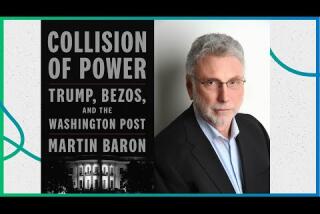‘The Death of American Virtue: Clinton vs. Starr’ by Ken Gormley
Shortly after Duquesne University law professor Ken Gormley decided to write a book about the crisis that almost ended Bill Clinton’s presidency, a powerful publishing figure offered some advice.
“I won’t name names, but a very prominent agent said: ‘No one’s going to care about the Clintons in another year or two, they’re passé,’ ” Gormley said recently over lunch here. “This was in 2000.”
Later, when it looked as if Hillary Clinton might win the 2008 Democratic nomination, other would-be experts urged Gormley to get his book out. But his publisher decided to stick with the writer’s timeline, deeming it too important to be rushed.
Weighing in at nearly 800 pages, Gormley’s “The Death of American Virtue: Clinton vs. Starr” spares nary a detail in its effort to be the definitive text on a saga that began with allegations about a 1978 Arkansas land deal and ended more than two decades later with a sensational report compiled by Ken Starr’s Office of the Independent Counsel and an impeachment trial in the U.S. Senate.
“The country was just completely divided on this,” Gormley said, “and I truly believe there has been nothing like it in our lifetime other than the assassination of President Kennedy and Watergate, in terms of a giant political story and intrigue that consumed the whole country.”
Because of the nature of his effort, Gormley necessarily repeats some shopworn tales. But he also has new finds. In 2001, Gormley writes -- a full two years after the Senate acquitted Clinton on perjury and other charges related to his relationship with Lewinsky -- an FBI agent grilled Secret Service Director Lew Merletti “in a last-ditch effort” to unearth evidence of a conspiracy to hinder Starr’s investigation.
There was also an aborted 1998 “effort . . . to indict First Lady Hillary Clinton” for hiding evidence about her work as a lawyer for an Arkansas financial firm. In addition, Gormley reports that the president’s lawyers were so wary of Starr that they kept a vial of Clinton’s blood on hand “in case [Starr’s office] tried to pull a trick” with the sample taken for the Lewinsky investigation.
And the book quotes a lawyer who worked on the 1994 sexual harassment lawsuit by then-Arkansas state employee Paula Jones as saying the president could have made the whole matter go away for as little as $5,000; a settlement of that case might have prevented the scandal that followed, as Lewinsky’s name came to light only when she was called as a witness.
Gormley interviewed Clinton three times, and in the book the former president discusses the scandal at perhaps greater length than at any time since he left the White House. He complains about press coverage and still exhibits anger when discussing Starr. Clinton told Gormley: “What should never happen is that someone [like Starr] should be appointed a prosecutor with unlimited powers.”
The book’s portrait of Starr, meanwhile, contrasts with the perception that religious and ideological fervor fueled his desire to topple what he viewed as a libertine president. Gormley rebuts the notion that Starr began independent counsel meetings with a moment of prayer, and writes that he would gently scold colleagues who failed to show respect for the office of the president when discussing Clinton.
“Despite later accounts advanced by pro-Clinton advocates suggesting that Ken Starr, in his role as Whitewater special prosecutor, was a partisan zealot from start to finish, the record fails to support this portrayal,” Gormley writes.
Reached by phone, Starr said that Gormley’s “Archibald Cox: Conscience of a Nation,” a 1997 biography of the Watergate prosecutor, had convinced him the author was serious. As for the new book, Starr continued, “He made it clear that he was in no particular rush, that he viewed it as a very long-term project with the hope of capturing and harvesting as much information and insight as one researcher could. There was a scholarly, historical dimension to his vision that I found attractive.”
Despite his cooperation, some aspects of Starr’s tenure are portrayed less than flatteringly. One prosecutor working for Starr was “startled by the new independent counsel’s lack of preparedness for the job,” Gormley writes, adding that Starr “seemed to be an academic fish out of water.” The public, meanwhile, was increasingly skeptical.
“Ken Starr, by the time you get to the Lewinsky matter, was viewed by at least half the country as an out of control partisan zealot,” Gormley said. “Now that may have been unfair, and it probably was unfair, but the whole thing is perception of neutrality. You could have gotten 8,000 other people who did not have that baggage at that time. I think it was a horrible mistake for him to go into that matter.” (Starr concedes as much in the book, telling Gormley: “It had to be investigated. But I was a poor choice to do it.”)
As it happens, Gormley wouldn’t have written his book without Starr. “The very first person I approached for an interview was Ken Starr,” he said, recalling the correspondence that led to Starr’s first on-the-record interview with him on Jan. 6, 2000. “I just wasn’t interested in writing a one-sided book about Bill Clinton. It was very important to me that this was not a pro-Clinton book or a bash-Starr book.”
Of course, much has happened since the showdown between Clinton and Starr. We’ve seen the disputed 2000 presidential election, Sept. 11, wars in Iraq and Afghanistan, an economic meltdown, the election of the country’s first African American president and a protracted healthcare debate.
Blogs and Twitter have quickened the pace at which we process information. Will people read a massive book about a scandal that seems to have happened a long time ago?
Walter Shapiro, who covered the Clinton White House for Esquire and now writes for AOL’s Politics Daily, said even the smallest detail can propel a book of this kind into the news cycle. That’s what happened with John Heilemann and Mark Halperin’s “Game Change,” which contained a brief reference to Senate majority leader Harry Reid’s now-controversial comments about Barack Obama’s skin tone and speaking style.
“This was a throwaway line that the authors have admitted in public they didn’t think was that important compared to other revelations in the book,” Shapiro said. “But it dominated cable television on a nonstop basis.”
By the end of the 1990s, Gormley had already started thinking about a Clinton book. He secured a ticket for the first day of the Senate impeachment trial in January 1999, then spent a decade working on “The Death of American Virtue.”
And now, for Gormley, the 1990s are finally over.
More to Read
The biggest entertainment stories
Get our big stories about Hollywood, film, television, music, arts, culture and more right in your inbox as soon as they publish.
You may occasionally receive promotional content from the Los Angeles Times.






